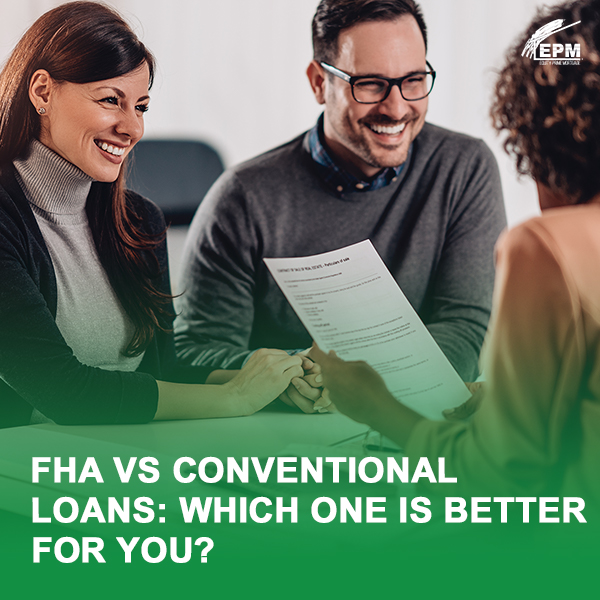FHA vs Conventional Loans: Which is Better for You?

Posted by Eric Skates on
There are lots of programs and pathways to getting into the homebuying market. For first-time homebuyers especially, two types of low downpayment loans are FHA and Conventional loans. Your Lender at EPM can help you take a deeper look and decide which mortgage is right for you. But we also want to take some common questions and lay out the pros and cons of both types of mortgage loans, so you can get a head start on understanding what the lending requirements are, and which type of loan might fit your needs best.
What’s the Difference between FHA and Conventional Loans?
FHA stands for Federal Housing Administration. And FHA loans are backed by the federal government. The FHA insures these home loans and they are available through FHA approved lenders throughout the US. This is often a good place to start for first time homebuyers who don’t have a large down payment available or may have a lower credit score.
Conventional Home Loans are originated and serviced by private mortgage lenders, banks, and credit unions. Many lenders who offer conventional loans will also offer government insured loans. If you have a stronger credit score, or have saved a 20% down payment prior to applying for your loan, you may qualify for a conventional loan.
Generally you are going to pay a 3.5% down payment on an FHA loan. If you have a lower credit score or debt to income ratio, that could increase to 10%
Conventional loans require a 20% downpayment. If you dont have 20% to put down, you have to buy PMI ( Private mortgage insurance) and the premiums could mean you end up spending more in the long-run. See our previous post on PMI for more information
What Should I Know About My Credit Score and Mortgage Loans?
With an FHA Loan, your FICO score can sometimes be in the low 500s, but lenders may require you to build that up higher first before they will approve your loan. You also are going to have to keep in mind some other things beyond your credit score alone, such as payment history and debt to income ratio. If you have had a bankruptcy in your past, an FHA loan might be easier available to you than a conventional loan. The lower your credit score, the higher the expected down payment might be.
With Conventional Loans, you need a minimum credit score of 620, but again, since the pandemic, many lenders are looking to push those requirements up. A higher credit score will also help lower your interest rates.
What about Mortgage Insurance on an FHA or Conventional Loan?
FHA Loans are insured by the Federal Housing authority and your up- front mortgage premiums are 1.75% of your loan. The FHA gets these premiums upon the closing of your home, but you will have it added to the overall cost of your mortgage and pay on it during the life of your loan. You will also pay the FHA an annual Private Mortgage premium that your lender will help you calculate based on the length of your loan, the amount you put down, and the value of your home.
Conventional loans offer PMI ( Private mortgage Insurance) and you will pay the premiums for at least 60 months on a 30 year mortgage. If you have a 15 year mortgage- once you have paid off roughly 22% of the value of your loan, the mortgage payments can end.
Now that you have an overview and are equipped with some information to get the ball rolling, the trusted lenders at Equity Prime Mortgage would love to help you find out what loan is best for your individual needs. We are here to answer your questions, and get you started on the road to homeownership with confidence.



